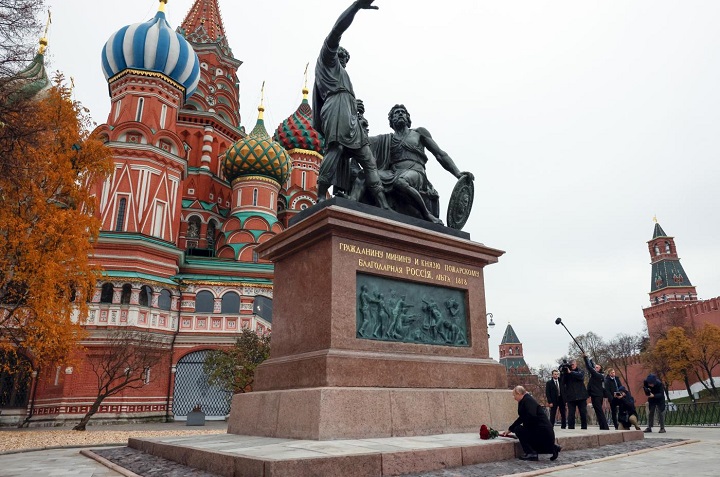
There are three trends at work in Russia presently, all of which may be conducive to a break up of Russia and a new order in the old Eurasian continent.
The three trends are on different time scales.
The long-term trend is the one stretching back centuries, right from the beginning of Russia as we know it.
Russia became a powerful kingdom in the late 16th century with the rise to the throne of Ivan the Terrible, who expelled the Mongols of the Golden Horde that had ruled over Moscow.
Shortly before that, a few decades earlier, the brethren of the Moscow Mongols, the Mughals sitting in Central Asia, right behind the Urals, saw an opportunity in the turmoil and the difficulties in India. From their homebase in what is modern Uzbekistan, they moved south and conquered all of what is now the Indian subcontinent. This created a space, an emptiness into which the Golden Horde withdrew when retreating from Moscow.
The same thing happened at the time of the second wave of Russian expansion under Peter the Great in the second half of the 17th century. Then the Manchu ruling over eastern Siberia and Mongolia descended onto China and conquered it. This left eastern Siberia free, and Russians just stepped in. The Russians went east in a series of successive wars that established their dominance over the region, while the Manchu were more interested in controlling rich China than fighting for some frozen land in Siberia.
However, these two trends have been reversed in recent years. The rise of China, India, and even that of the ex-soviet Central Asian republics, linked through the Caspian Sea and the Caucasus to the Black Sea, is pushing back former Russian dominance over the region.
That is, Asia is richer and more powerful than it has been in many centuries, and despite the short- and medium-term political changes, this rise of Asia looks like it is a long-term event and therefore objectively limits Russian presence.
On top of this very long-term trend, we have another experience from Russian history. In the past century, political turmoil and a massive setback followed each time Russia was defeated in war.
The first time was in 1905, when Russia lost to the Japanese and the Tsar was forced to concede to a constitutional government. The second time occurred in 1917, when Russia lost to the Germans and Lenin led the soviet revolution. The third time was in 1989, when Russia lost its war in Afghanistan and the USSR dissolved. This means that a military defeat in Ukraine could bring massive political upheaval in Russia now.
Russia has already lost the war against Ukraine because it failed to win it as promised in 15 days. In September, it gave up on the “special operation” and started a general mobilization. Therefore, there is already a political defeat, the point now is to see if the military defeat will be too large to be politically managed.
The combination of these two trends is already quite ominous, independent of whatever objective one may decide to pursue around Russia.
Here some of its neighbors argue that Russia at the end of the Cold War had every opportunity to turn around and be part of Europe, but it quickly pursued another path. Now it should be punished to make a return to aggression impossible.
It is risky to try to salvage Russia in some way, spare it humiliation, and then have it angered again in ten or twenty years and seeking a revenge, like Germany after World War I.
It is at the same time disastrous to think that Russia should be partitioned and that it would disappear as a state—nothing of this kind has happened in modern history, especially for an old European power.
The point is that Russia itself has to come to grips with its reality and think clearly, not according to its wishes but starting from the real situation. When a soldier is wounded and is about to lose a leg, you want to amputate well above the wound rather than risk killing the man by gangrene.
Moreover, the whole geography of Eurasia is turning upside down.
Iran seems set to topple the ayatollahs’ regime, which kindled a wave of Islamic radicalism that defined the Middle East and Central Asia for decades. The return of a “normal” Persia will change the region. To regain control the Ayatollah need a bloodbath that would change Iranian society and scare Iran’s neighbors with unpredictable consequences. In either case there is an on-going a political earthquake.
If it is coupled with a redefinition of Russia, Eurasian politics will be totally new. China could feel really under siege, while currently US-friendly India, with traditional good ties to both Moscow and Tehran, could be a big winner of the game.
India will try to capitalize on the situation, it won’t be easy but also not impossible. This, in turn, could make China and also Pakistan more nervous. Turkey, so far a big winner in the present game, could reach into Central Asia, through its old connections to the local Turkic population.
It could be a global revolution like the Mughal and Manchu expansions both at once and thus with larger implications.
Russian leaders should think of their very difficult predicament and stop the war today to hold the situation together and not allow it to spin totally out of control. The question is whether their daily worries will give them enough time to think about it.





